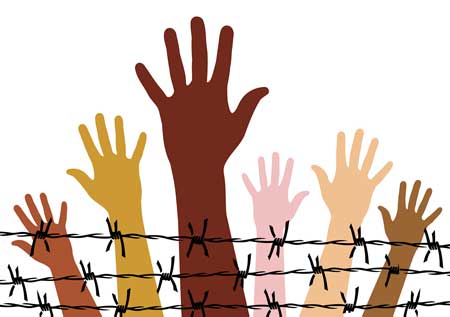 The history of human civilization is the history of struggle for human rights. This struggle calls for an organized socio political environment where power will be exercised in a legitimate way. The latest version of the system is known as governance. The term governance is turned into good governance when it begins to work for ensuring human rights. So good governance starts from and ends into human rights.
The history of human civilization is the history of struggle for human rights. This struggle calls for an organized socio political environment where power will be exercised in a legitimate way. The latest version of the system is known as governance. The term governance is turned into good governance when it begins to work for ensuring human rights. So good governance starts from and ends into human rights. Human rights encompass all aspects of human existence. It is generally accepted that its scope includes political and social rights as well as economic ones. Rights can be ensured through alleviation of problems rooted in long-standing social and political ills.
The concept of good governance emerged in the late 1980s to address failures in development policies due to governance concerns, including failure to respect human rights. The concepts of good governance and human rights are mutually reinforcing, both being based on core principles of participation, accountability, transparency and State responsibility.
Human rights require a conducive and enabling environment, in particular appropriate regulations, institutions and procedures framing the actions of the State. Human rights provide a set of performance standards against which Governments and other actors can be held accountable. At the same time, good governance policies should empower individuals to live with dignity and freedom. Although human rights empower people, they cannot be respected and protected in a sustainable manner without good governance. In addition to relevant laws, political, managerial and administrative processes and institutions are needed to respond to the rights and needs of populations. In a word human rights and good governance are two sides of the same coin and the parliament is the most important weapon of protecting both sides of the coin. The significance of good governance for ensuring human rights is acknowledged in mainstream international human rights instruments. Article 21 of the UDHR recognizes the importance of a participatory government and article 28 states that everyone is entitled to a social and international order in which the rights and freedoms set forth in the Declaration can be fully realized. The two International Covenants on Human Rights contain language that is more specific about the duties and role of governments in securing the respect for and realization of all human rights.
Human rights strengthen good governance frameworks. They require: going beyond the ratification of human rights treaties, integrating human rights effectively in legislation and State policy and practice; establishing the promotion of justice as the aim of the rule of law; understanding that the credibility of democracy depends on the effectiveness of its response to people's political, social and economic demands; promoting checks and balances between formal and informal institutions of governance; effecting necessary social changes, particularly regarding gender equality and cultural diversity; generating political will and public participation and awareness; and responding to key challenges for human rights and good governance, such as corruption and violent conflict .
In Bangladesh, Good Governance and human rights are widely debated and discussed issues during recent years. Being a member of third world, Bangladesh is largely dependent on the aids and grants of the donor countries. Recently the donor countries are more concerned about the governance status of the recipient country in case of approval of any types of aids and grants. This is why the term 'good governance' is the talk of the day and 'human rights' is one of the important pillars of good governance.
In Bangladesh, it is evident that the present condition of governance is not satisfactory. Many issues and problems are creating the barriers to ensure good governance, equity and social justice. Corruption, political interference in administration, nepotism, misuse of power, absence of rule of law, non-accountable and non-transparent government and administration etc. are the common features of our governance. A quick glance at the realities within the constitutional arms and the management of economic, administrative and the political affairs further strengthens the statement on crisis in governance. Although a lot of measures have been taken for ensuring good governance, good governance is not easy to achieve in Bangladesh. This is mainly because several problems i.e. poverty, corruption, nepotism, manipulation of power etc. are deepened into the social, cultural, economic, administrative and legal variables that affect the nature and consequently determine the shape of governance.
To ensure increased good governance, time has come for us to think about the administrative and legislative reforms. Among others we should reconsider for amending Article 70 of the constitution to curve its abuse and free the public representatives to voice people's aspiration in the parliament. Human rights urge for making the proper channel for accommodating public into the governance so that their voices are heard and their rights are given the utmost priority.
Mahmudul Hasan is LL.M. candidate 2015 at the University of Dhaka




